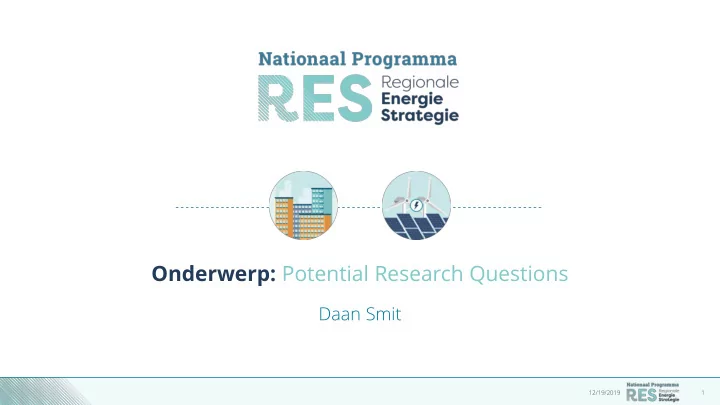

Onderwerp: Potential Research Questions Daan Smit 12/19/2019 1
Agenda • Who am I • What is the RES • Regional context • Potential research challanges 12/19/2019 2
Who am I Education • 1996-2001 Hanze University of Applied Sciences, Management, Economics and Law • 2001-2003 University of Groningen, Business Administration Work experience • 2003-2009 Hanze University of Applied Sciences (contract management) • 2009-heden Royal HaskoningDHV (engineering and consultancy company) • Since April 2019 process facilitator of the ‘ Regionale Energiestrategie Groningen’ (Regional Energy Strategy Groningen) 12/19/2019 3
What is the RES 12/19/2019 4
What is the RES 12/19/2019 5
What is the RES Dutch Climate Agreement In terms of electricity, for 2030 the goals is to ensure: - 48 Twh wind energy off shore - 35 Twh renewable energy on land (wind and solar) - 7 Twh solar on small roofs ( 50 PV) 12/19/2019 6
What is the RES 30 RES regions Goals ls (tota otal l for the Netherl rlands) s): 35 35 Twh renewable le energ rgy y product ctio ion on n lan and in n 203 030 0 (col ollec lective tive go goal, al, no no distribut ribution ion per region ion!) !) 1,5 million buildings free of natural gas before 2030 7 million buildings free of natural gas before 2050 12/19/2019 7
What is the RES To produce 35 TWh elektricity in the Netherlands means 5320 windmils of 3 MW on land Or 55.000 hectare of Solarfields with 0,8 MW pro hectare. 12/19/2019 8
What is the RES Regional onal Energ rgy y Strate tegy Groningen Collaboration between: 12 municipalities in Groningen 2 Waterboards Poli litic tical l proce ces! s! The province of Groningen 10 stakeholders What will be be the Groningen en bid? 12/19/2019 9
What is the RES Starting ting points ts agreed ed in the Startd tdocu ocument t RES Groningen - Regional perspective, we help eachother to develop a regional strategy with mamximum social acceptance - A realistic offer with projects that respect the landscape and the people - Looking for opportunities for employment - Local ownership, social acceptance and fair distribution of benefits and burdens 12/19/2019 10
Regional context • Relatively low income and high percentage of home owners • Relatively old building stock • Low population density (rural area) • Earthquakes due to gas mining (no possibility for geothermal energy production) • (local) resistance against wind parks (and solar fields) • Many large scale projects (the 5 biggest solar fields are located in Groningen, runner-up region in on- shore wind energy) • Groningen is a traditional energy region 12/19/2019 11
Potential research challenges • Balancing demand and production • Expected growth of electricity demand • Defining social acceptance • How can the region and its inhabitants benefit from being an energy region? • What are the consequences of going to a decentralized energy production system? • Which costs for heating the built environment should be socialized and which costs should be carried by individuals (house owners)? • What are the roles of the government, citizens and market parties in implementing the regional energy strategies? 12/19/2019 12
Recommend
More recommend